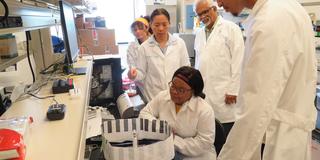Central State University named partner institution on $10 million NEXTGEN agriculture award

Central State University (CSU) is partnering with three other universities to receive a $10 million award from the U.S. Department of Agriculture National Institute of Food and Agriculture to recruit, educate, train, and retain the next generation of diverse food and agriculture professionals.
The From Learning to Leading: Cultivating the Next Generation of Diverse Food and Agriculture Professionals (NEXTGEN) award was given to CSU and Lincoln University, two Historically Black Colleges and Universities (HBCUs), along with a Hispanic-serving institution (HSI), Texas A&M University, and one Research University (RIU), Missouri University of Science and Technology.
“The goal is to train our undergraduate students to become the essential workforce for the future of agriculture in the United States,” said Dr. Hongmei Li-Byarlay, CSU’s principal investigator (PI) for the project, research associate professor of entomology at CSU, and project director for Pollinator Health, Agricultural Research Development Program. “The grant will provide a lot of training opportunities and research internships for students to explore a variety of topics in agriculture, especially in soil science, entomology, and life science.”
The four institutions will work on their award-winning project, titled HBCU-HSI-RIU Consortium: A Synergistic Paradigm for Training the Next Generation Agriculture Workforce for a Sustainable Future. Team members from partner institutions consist of research, education, and extension professionals to maximize the impact on minority populations from grades K-12 to graduate school.
“The NEXTGEN project presents an exciting opportunity for Central State to increase its impact on the next generation of agricultural workers by supporting increased minority participation and knowledge attainment. The $2.5 million grant will also help recruit outstanding students for the agricultural workforce,” said Li-Byarlay.
“For the people of Ohio, this award is important. Our university is building a workforce for agriculture...and Ohio is predominantly an agricultural state. We need to train citizens of Ohio to do research, to study and extend scientific knowledge on agriculture to the farmers. That is the main intent of this project,” said Dr. Sharath Krishna, co-PI and professor of biology and agricultural and life sciences at CSU.
The other CSU co-PIs are Drs. Sakthi Kumaran Subburayalu and Prosper Doamekpor — each of whom has a wealth of knowledge and expertise in agriculture and minority workforce development.
“Central State’s major project goal is to establish an inter-institutional collaborative graduate program that emphasizes soil sciences and entomology,” said Dr. Morakinyo Kuti, interim Dean of the John W. Garland College of Engineering, Science, Technology, and Agriculture and director of the Land-Grant program at CSU. “This initiative complements Central State’s existing programs in sustainable agriculture, water resources management, environmental engineering, and experiential learning where undergraduate students currently conduct research in soil conservation, integrated pest management, pollinator health, horticulture, and other relevant topics.”
One component of the program is working with Lincoln University, which will assist CSU with development and implementation of master’s and doctoral degree programs within the next five years. In addition to the new graduate program, the project will support courses on precision agriculture and drone application, yearly geospatial information science activities, a summer workshop on regenerative agriculture, professional learning and scholarships, youth programming, and other related initiatives across the four consortium institutions.
“We are excited about working with the experts at Lincoln University to start these graduate programs in entomology, soil sciences, and agricultural life sciences,” said Krishna. “This is an important step in recruiting, educating, training, and retaining the next generation in agriculture.”
See and hear WYSO 91.3 story here.